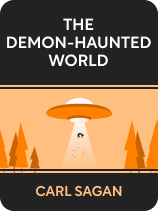

This article is an excerpt from the Shortform book guide to "The Demon-Haunted World" by Carl Sagan. Shortform has the world's best summaries and analyses of books you should be reading.
Like this article? Sign up for a free trial here .
What if the general public were more scientifically aware? What’s the path to get there?
In The Demon-Haunted World, Carl Sagan shares his concern about science illiteracy, especially in America. He believes that a general public that’s equipped with more knowledge about scientific principles and methods would be a positive force in the world. He outlines two ways to increase science literacy: improving science education (including instilling more enthusiasm for science) and increasing funding for scientific research.
Let’s take a close look at this advice from Sagan.
Carl Sagan on Science Literacy
A key argument of The Demon-Haunted World is that a scientifically literate public will greatly benefit society. Therefore, Sagan argues we must increase awareness and appreciation of science in the education system and in the general public. We can do this by increasing public funding of scientific research, as well as by communicating the discoveries, principles, and wonders of science in the classroom.
Improving Science Education
Many of the problems we encounter today are a result of a lack of critical and skeptical thinking. Sagan argues that the issues are systemic and begin in the classroom. There will be no single solution to the problems in our education system. It will take an extensive, collective effort to make sure our society is better educated and more scientifically literate. For various reasons, children are often discouraged from learning science, critical thinking, and the application of skepticism. This can lead to a general public with a disinterest, or even distaste, for science. When we don’t teach our children the methods of science, we take away our ability to manage our future.
(Shortform note: In The Demon-Haunted World, Sagan bemoans the lack of math and science literacy in the United States, especially when compared to other countries. A recent study found that, while the US has improved in math and science proficiency since the book was published, we still lag behind many other countries. As recently as 2017, in a test of 71 countries, the United States finished 38th in math and 24th in science.)
Instilling Enthusiasm for Science
According to Sagan, a key first step in improving our scientific education is to encourage a zeal for learning and present science as the awe-inspiring field that it is. To keep students enthused about science, Sagan gives some practical advice:
- Provide more funding for science education, especially for teachers’ training and salaries.
- Make sure children get hands-on experience with the scientific method, not just read about it in a textbook and memorize it.
- Examine what keeps kids’ attention and build curricula around it.
- Encourage kids to be ambitious and curious.
If we wish to increase science literacy, we must not only give students the tools for critical thinking and problem-solving: We must inspire them to passionately apply these tools in their daily lives.
| Teaching Science’s Value While Sagan’s suggestions of investing more money in teachers, giving students more hands-on experience, and building curricula around students’ curiosity are great places to start, these actions may not be enough to keep kids interested in science. Researchers have found that many students decide not to take the more difficult science and math classes when they reach upper grade levels. Like Sagan, these researchers suggest that making math and science more enjoyable is the easiest way to increase science uptake. However, once a child has decided they don’t like science or that they aren’t good at math, it can be difficult to change their minds. If you can’t convince children that science is fun, another relatively simple solution to this problem is to convince them that it is valuable. If a student believes a class is important for their future, they will be more likely to take it, even if they don’t enjoy it. Parents, teachers, and school administrators can help students see the value in math and science courses. Simply talking with children can do the trick, but sharing research on the financial benefits of science education will also help. |
Increasing Funding for Scientific Research
Another significant area in which America, and most other countries, could improve is in the funding of basic scientific research. Basic research, as opposed to applied research, is scientific research with no short-term purpose in mind. With basic research, scientists are free to follow their curiosity, study what interests them, and seek knowledge for knowledge’s sake. Sagan argues that this type of research is not just important to scientists—it benefits all of society. Most major scientific discoveries were made possible by basic research.
Despite the historical precedence of the importance of basic research, there is a growing trend in the federal government to spend less money on its funding. At the time of The Demon-Haunted World’s publication, research funding by both the private and public sectors was in decline, while the government’s military budget, much to Sagan’s chagrin, was over $300 billion. The funding of scientific research, he argues, is much more important to humanity than the funding of the military. What Sagan fears is that this decline in government-subsidized research will continue, and innovation, beneficial scientific discoveries, and the public interest in science will decline as a result.
| Data Check: Government Spending on Basic Research Versus Military While the US government’s funding of basic research has increased since 2000, the proportion of basic research by the federal government has declined. Furthermore, for the first time in decades, the federal government no longer funds the majority of basic research in the United States. Most basic research is now done by pharmaceutical companies or other corporations, as they hope the research will result in new drugs, products, or technologies that will generate profits. In 2019, total research and development funding reached about $650 billion, with the federal government only accounting for around $140 billion of that total. Meanwhile, the US military and defense budget ballooned to $731 billion in 2019. The disturbing trend Sagan noticed in the 1990s has continued well into the 21st century. |
Exercise: Review Your Science Literacy and Education
Sagan argues improving science literacy and education would greatly benefit society. Let’s examine your scientific knowledge and education and think about what could be done better.
- Think back on your education. Did you enjoy learning math and science? How much time did you spend learning and applying the scientific method or critical thinking skills? Do you think you should have been taught more in these areas? Why or why not?
- How familiar are you with the scientific method? How often do you use it in your daily life? Do you regularly read articles about recent scientific discoveries? If so, do you think you do enough to determine if the evidence presented is valid or invalid? Do you feel you even have the know-how to make such a distinction? Why or why not?
- How might you use the scientific method to evaluate claims you encounter from media sources? How might it help you determine if something is true or false?

———End of Preview———
Like what you just read? Read the rest of the world's best book summary and analysis of Carl Sagan's "The Demon-Haunted World" at Shortform .
Here's what you'll find in our full The Demon-Haunted World summary :
- Carl Sagan’s argument that a less scientifically-minded society is a less prosperous one
- Why you must remain critical and well-informed in an increasingly complex world
- The decline of educational standards in America and possible ways to reverse it






